-
THE PLACE (Paolo Genovese 2017)
PAOLO GENOVESE: THE PLACE (2017)
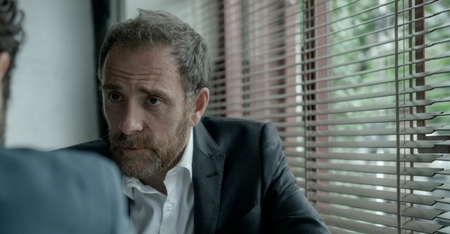
VALERIO MASTRANDREA IN THE PLACE
Nest of snakes
In the Davide di Donatello-nominated film The Place, a sad-sack mystery man (Valerio Mastrandrea) sits, seemingly continually, in the back of a cafe-diner with that name, receiving a constant stream of visitors. To each of them he grants wishes. In return, he gives them tasks to perform. These, in proportion to the difficulty or importance of what they request, are extreme or criminal. They must rob a bank to be prettier, kill a stranger's child to save a cancer-stricken son. Is this man an agent of God, or the Devil?
This film is closely based on Christopher Kubasik's US FX cable TV series "The Booth at the End." It began as a web-only series in tiny segments, like "High Maintenance." In fact all or most of the stories and characters come from that series, except that we are in Italy. Genovese's Italian dialogue is simple and natural. Genovese likes choral, multi-story features. His 2014 Blame Freud/Tutta colpa di Freud was a simpler collection, three people, three stories, one shared psychiatrist. His 2016 Perfect Strangers/Perfetti sconosciuti ups the ante to six long-time friends, who assemble for a dinner and agree to share increasingly complicated and revealing secrets via text, email, and phone messages they receive.
This time, another mixing up of personal stories occurs, and Genovese has upped the ante even further because now there are eleven "perfect strangers" (and they really are strangers, though they begin in some cases to find out about each other). The Place has enlisted the accomplished assistance of stars like Alba Rohrwacher, Silvio Muccino, Rocco Papaleo, and the hot young actor Alessandro Borghi, who also has key roles in Fortunata and Naples in Veils (everyone seems to want him these days). The stream of strangers approaching the mysterious man strike Faustian bargains with him. The most extreme example is the old lady, desiring to have her husband's Alzheimer's removed, who is assigned by the man to plant a bomb in a restaurant. Hardly less radical, a man must kill another child to save his own.
Will they carry out their task? Can they? Repeat visits to the Man tease us with delays or changes of mind. The old lady goes back and forth numerous times, and then winds up with a real surprise. In fact surprises and twists are one of the story's main aims, which may seem to cheapen the solemnity of the old-fashioned focus on deep moral questions. But this is a structure we know from movies and short stories forever.
As the visits begin to multiply and we begin to take in the personal stories and the tasks assigned, it develops that the people and their tasks are beginning to overlap, in dangerous ways. (Perhaps this God is a clumsy God?) Meanwhile a woman on the night shift at the cafe, Angela (Sabrina Ferilli), takes a growing interest in the mystery man, naturally enough, since he is always there when all other customers are gone. His world-weariness clearly attracts her, and also his mystery, as they do us. Ultimately despite his secret identity, he becomes the richest character, since we spend by far the most time with him.
The Place is importantly different in effect from its TV series source in that it collapses many stories spread over time originally into only 105 minutes. There is no time for the viewer to absorb and contemplate. But of course this is no more than binge-watching, which is what many people do anyway. In this condensed form, it is the more obvious that the nameless, exhausted magus does not sleep, that he is mysteriously inexhaustible as well as always tired, and this is a process that never stops. The film is engaging, fascinating, challenging, ultimately a little bit too much to take in, and, given its lack of resolution, a little bit less than we may have expected, though its texture is finely honed.
This film is plainly designed for adults, who would have the patience for its complications and repetitive structure and talky format, but the theme seems best designed for young people as a way of posing moral questions. The fundamental one: how far is it acceptable to go to achieve one's desire? If you could get what you wish for, would you do anything to get it? What desires really are worth pursuing? Is morality relative? This is an intensive look at the extremes of egocentrism, but also of the pain of living in the world, having, for example, a sick child.
The Place is engaging and slick to the Nth degree, well shot and beautifully acted, directed, and filmed. Like much Italian cinema today, however, it takes no real chances, goes only so deep, and, being basically a remake, is fundamentally unoriginal. A great deal of talent has been used to satisfy us with much less than the masters provided during the great years of Italian cinema.
The Place, 101 mins., opened in Italy in Nov. 2017 and in a dozen other countries in 2018; only three small festival showings. Screened for this review as part of Open Roads: New Italian Cinema 2018 at Lincoln Center, at the Walter Reade Theater.
Showtimes:
Thursday, May 31, 3:30pm & 9:00pm (Q&A with Paolo Genovese at the 9:00pm screening)
Last edited by Chris Knipp; 06-03-2018 at 05:33 AM.
-
RAINBOW: A PRIVATE AFFAIR (Paolo Taviani 2017)
PAOLO TAVIANI: RAINBOW: A PRIVATE AFFAIR (2017)
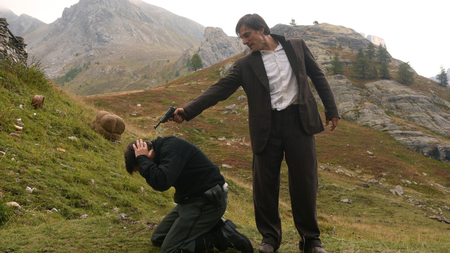
LUCA MARINELLI (RIGHT) IN RAINBOW: A PRIVATE AFFAIR
One man's war
Sailing around the landscape is something tie Taviani brothers (who made films in tandem for 62 years) always excelled at: their 1982 Night of the Shooting Stars/La notte di San Lorenzo is full of that. And it happens here, in this feature completed by the 86-year-old Paolo in the absence of his brother Vittorio, who died in April at 88. Based on Beppe Fenoglio’s 1963 novel, this is a war story with a peculiarly Italian focus, Italy’s mid-1940's civil war between partisans and fascists. It's not about the outlines of the conflict but a personal struggle, a "private issue," as the Italian title says, Una questione privata .
Roger Ebert wrote about La notte di San Lorenzo, which is impressive without being moving, that it was "[a] beautiful film, but it's a disappointment, a series of scenes in which peasants to wartime Italy seem to be posing for heroic post office murals." One can see Rainbow much the same way, only the tableaux are not so heroic. The focus is on the effort of Milton (Luca Marinelli), so nicknamed for his love of English literature, to find a fascist captive to trade for his partisan best friend, who has been caught by the other side.
Luca Marinelli is tall and handsome in a soulful Italian way, dramatic features, big blue-grey eyes, though he's most notably played a crazy drug addict and a petty criminal in They Call Me Jeeg and Dn't Be Bad (both N.I.C. 2015). We spend a lot of time with him, but it's the captured best friend Giorgio (Lorenzo Richelmy) who's considered the handsome one. Flashbacks show they and the girl they both loved, Fulvia (Valentina Bellč). She is a thin, angular young woman who likes to dance. Valentina Bellč looks good in Forties clothes and hairdo. They loved the record of the Wizard of Oz song by Yip Harburg, "Somewhere Over the Rainbow." A couple of years ago they spent an idyllic time at Fulvia's family villa, which Milton nostalgically revisits. It's empty now; Fulvia has gone to Turin.
Milton is in dangerous situations, as he goes from one partisan base to another, but his obsession is finding a scarafaggio (roach) to exchange for his friend. Loyalty and jealousy war within him, as he fears Fulvia may not only prefer Giorgio, but even may have lost her virginity with him. He wants to know.
Some vignettes stand out. Milton finds a crazy scarafaggio chanting and beating imaginary drums (Andrea Di Maria). He's a prisoner, but apparently he's so crazy no scarafaggi want him. He gets one scarafaggio (really, they use this term exclusively), but we know it's going to go badly when Milton asks the man what his name is and where he's from. Deborah Young in her Hollywood Reporter review notes with approval that all this is without the usual macho posturing and heroism of most war movies. True, but it is dominated not so much by excitement as a vague anxiety. Pursuing his own private project, Milton is among the partisans but not quite one of them.
This film has a certain quiet grandeur about it. The Tavianis are on very familiar ground here, going back to the time their first films focused on and the moment that ushered in Neorealism, when Italian cinema had its period of greatness, its renaissance. But this movie arouses mixed reactions. Rather than a "bland literary adaptation" (according to Jay Weissberg's Variety review)- or "a quiet classic," as Deborah Young says in Hollywood Reporter, it's obviously somewhere in between, but Weissberg has a point when he says the fog flowing over the Piedmont hills in this movie symbolizes a "hoary artificiality" - fine cinematic tradition that this time has lost its vigor. But this does not detract from the Taviani's fine work in the past, and just six years ago their film of a prison drama production Caesar Must Die (NYFF 2012) was original and powerful.
Rainbow: A Private Affair/Una questione privata, 84 mins., debuted at Toronto; seven other festivals including Busan, Rome, Tokyo and Belgrade. Screened for this review as part of the Open Roads: New Italian Cinema series 31 May-6 Jun. 2018 at Lincoln Center.
Showtimes (Walter Reade Theater)
Friday, June 1, 2:00pm
Monday, June 4, 6:30pmf
Last edited by Chris Knipp; 06-01-2018 at 01:24 PM.
-
DIVA! (Francesco Patierno 2017)
FRANCESCO PATIERNO: DIVA! (2017)

VALENTINA CORTESE IN DIVA!
A virtuoso life in film
What do we know about Valentina Cortese? Perhaps not a lot compared to contemporaries like Anna Magnani and Alida Valli. Begin with her supporting role, Oscar-nominated, of the alcoholic movie star in François Truffaut's Da for Night. Ingrid Bergman beat her for a performance in Murder on the orient Express and, properly, said in her acceptance speech that the Oscar should have gone to Cortese. Bergman's award was honorary, and for an insignificant part; Cortese's performance was striking and selfless. Truffaut acknowledged his debt when he got the Best Foreign Oscar: "It is easy to win an Oscar if Valentina Cortese is involved," he said. For a short review of highlights of Cortese's career see the biographical summery on IMDb. The filmography below covers a fifty-three-year period and also included work with Joseph L. Mankiewicz, Terry Gilliam, and William Dieterle. It was a theatrical career too, burnished by a romantic and professional relationship with Italian theatrical legend Giorgio Strehler.
I watched this film at 4 pm on 1 June 2018, in the Lincoln Center series, Open Roads: New Italian Cinema, with the director, Francesco Patierno, present. He said this was an idea suggested to him by the producer that started as "un film piccolo, piccolo, piccolo che č diventato grande, grande, grande," "a little, little movie that became a big, big one." And it is an enveloping experience to watch it with its mixture of elements. This is a phantasmagoric collage and immersive biography based on Cortese's own autobiography Quanti sono i domani passati ("How Many Are the Days Gone By”), but with the information rearranged. She began with the fact that she was born of someone wealthy and immediately given away to be raised by contadini, peasants or country people. She attributed to the orphan feeling this gave her her desire to become an actress and play glamorous parts.
Patierno pointed at the screening to various instances when Cortese wound up playing roles that closely paralleled her own life.
Central to the film, which skillfully blands clips from a mind-boggling list of movies Cortese played in, is Patierno's use of no fewer than eight beautiful contemporary Italian actresses, all dressed to the nines, to recount times from Cortese's life in her own words, impersonating her but not mimicking her. Note, they are speaking in her voice, not "enacting" the moments they describe. They are: Barbora Bobulova, Anita Caprioli, Carolina Crescentini, Silvia D’Amico, Isabella Ferrari, Anna Foglietta, Carlotta Natoli, Greta Scarano.
Diva, which clearly is an exercise in inhabitation, a film that possesses and embodies its subject, skips around in time intentionally, partly to surprise the viewer and catch her off guard. It too begins with the performance of Cortese in Day for Night, which is so good it fools you into thinking it's clips of Truffaut trying to get a scene out of an alcoholic actress. The secret of the actress' abandonment as a baby, Patierno saves for late in his film, as a late bombshell. Before that are accounts of her experiences outside Italy, and especially with Jules Dassin (he and she were drawn to each other) and Darryl F. Zanuck (he played the Harvey Weinstein role).
Patierno goes back from Dassin's Thieves' Highway and Robert Wise's House on Telegraph Hill and later in the great era of Italian film performances for Antonioni and Fellini, to earlier, more conventional Italian films. Often clips from these films serve to illustrate moments from Cortese's own life recounted by one of her on screen avatars. Sometimes the music is conventional, surging, sugary; sometimes it is modern and electronic.
The latter recalls Patierno's biggest bombshell at the Lincoln Center screening Q&A: when asked if he had gotten to meet Valentina Cortese in person, he said Diva! just opened in Milan three days ago, and the 95-year-old Valentina Cortese had come for it. You can imagine the emotion, he said, for him and for her, to witness his film together - and if he could only project footage he shot that night on his iPhone, it would make an incredible supplement to Diva. This immersive film is so full of aural and visual information one should see it multiple times, preferably after reading Cortese's autobiography and other books about the directors she worked for. This is a rich gem of cinematic history, but it's greatest interest is in its inventive ways of recreating a film actor's life. It exists chiefly as a tour-de-force that may inspire similar efforts (as one can't help wondering of the multiple-voice narration wasn't inspired by Todd Haynes' inventive Bob Dylan biopic I'm Not There) - while outside of specialized Italian cinephile circles its actual subject matter may not be of enormous interest. But it is on the whole a creditable and interesting effort.
Diva, 75 mins., debuted at Venice,
Last edited by Chris Knipp; 06-09-2018 at 08:34 PM.
-
Crater (silvia luzi, luca bellino 2017)
SILVIA LUZI, LUCA BELLINO: CRATER (2017)
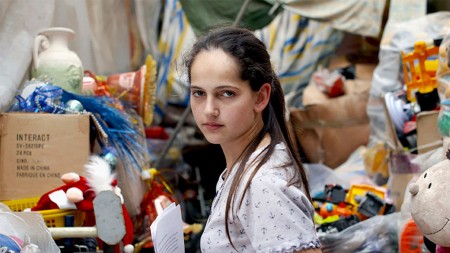
SHARON CAROCCIA IN CRATER
Control freaks
The team of Silvia Luzi and Luca Bellino have made several documentaries, but turn to a kind of docufiction in this feature debut using non-actors. Il cratere (Crater) focuses on Rosario Caroccia, a Neopolitan fairgrounds hawker who gives out stuffed animals to customer who try for a winning number. It also focuses on his thirteen-year-old daughter Sharon, who is pretty and can sing. When we say focus, we mean focus. The film's relentless visual device is to put the camera smack up close on its subjects, with everything else blurry, which is designed to make the experience depicted universal. It could be anywhere, because we never really see where it is.
There are four kids, and money is tight. Harsh, chain-smoking Rosario pushes Sharon to develop her singing talent, thereby to achieve, who knows? Fame, recognition, money -belting out for a wider audience the Neapolitan "neo-melodic" songs she has been performing in public one way or another ever since she was a tyke.
Singing is a quick route to fame compared to harder jobs like classical music or professional sports, the filmmakers have explained - evidently implying they considered those as topics, for a film about underdogs craving social recognition. For the pop route, you buy a song, which costs a thousand euros, then buy an audition on the "Ciao Italia" show or something like that, and when you perform your song, well, maybe it happens.
Crater is a pain to watch from the start. The visual style seems to thumb its nose at the viewer but, beyond that, Rosario is a really obnoxious guy. Bellino's pre-screening statement that this is a "carnival love story" drew objections from audience members who could see no love here. This is a father never happy unless he is yelling at his daughter or pushing her around. One can only hope this isn't real-life father and daughter Rosario and Sharon's actual relationship. And if it is, wherein lies the fiction?
Luzi and Bellino are trying to do something special here. In the first scene Sharon recites statements as if for a class about Giovanni Verga and verismo and Flaubert while making artificial gestures and this is to hint that Crater is a flat-out rejection of any kind of realism. Using people playing something close to themselves might contradict that. Their subject, to quote Jarmusch, may the the limits of control. Rosario's efforts to turn Sharon into a pop figure fizzle mainly because she's lazy. As he tells her, "You want to sing only when you feel like it." Indeed, and she really does like to sing, just not as a job. She's lazy about school too: she's missed a lot of it this year, and seems to spend most of her time watching TV with her friend Imma, the two of them singing along enthusiastically whenever a song comes on.
But in the peculiar, hard-to-watch filming method, and the strict limiting of the action, which only barely sketches in the rest of the family, and of course can't show them all together since it shows only one head or body part at a time, the filmmaking itself shows the limits of control. It's funny that documentarians would not have observed more and manipulated less. But as we said, manipulation is their theme. Rosario also sets up surveillance cameras in their house, and keeps watching the set of screens mostly showing empty rooms. Perhaps the most telling, and certainly poetic and haunting, shot is the final one, showing Rosario repeating over and over a short strip of surveillance footage of Sharon going out a door. This, and a sequence just before where he watches videos of her at various sub-teen stages performing songs, are rare instances where the camera doesn't sneak up and bite its subject but gives us a moment to think.
Of course stories like this have been told many times in film. Such scenes occur in any musical biopic. Imagine one about Michael Jackson and his "babbo". The action is, given the filmmakers' documentary skills, very realistic, no doubt also as to the recording studio, where the person on the controls sends Sharon away because her voice is too "nasal" and "raucous." That's not really noticeable, and we wonder if this actor, like Rosario, isn't overplaying the harsh side. The competition scene takes place, we guess - as with everything else we don't get to see much - but there isn't extensive development of the conventional music bio narrative. All we know is that Rosario's effort to push Sharon seems to begin losing steam at a certain point.
Those who like to be challenged may enjoy the visual style, though the idea that it conveys universality seems illusory. The experience offered is unique, also frustrating. The striving for universality seems undercut by the fact that the characters all speak in Campania accent you could cut with a knife, making the ambiance very specific even for Italians.
Crater has been compared to Visconti's Bellissima and also last year's film Indivisible, Edoardo De Angelis’ story about pretty conjoined twins exploited by their parents as novelty singers - which in turn may remind some of Fulton and Pepe's Brothers of the Head (SFIFF 2006). But those all offer rich visual worlds that Luzi and Bellino intentionally deny us.
Crater/Il cratere, 93 mins., debuted in the Directors' section at Venice Sept 2017; also was in competition t Tokyo, where it received a special jury prize; theatrical release in Italy 14 Apr. 2018. Screened for this review as part of the Open Roads: New Italian Cinema series at Lincoln Center, Q&A with the filmmakers.
[/QUOTE][/B]
Silvia Luzi, Luca Bellino 2017 Italy 94 minutes
Q&A with Silvia Luzi & Luca Bellino on June 2
Showtimes, Walter Reade Theater, Lincoln Center:
June 2
1:00 PM
June 4
4:15 PMf
Last edited by Chris Knipp; 06-02-2018 at 05:09 PM.
-
NOME DI DONNA (Marco Tullio Giordana 2018)
MARCO TULLIO GIORDANA: NOME DI DONNA (2018)
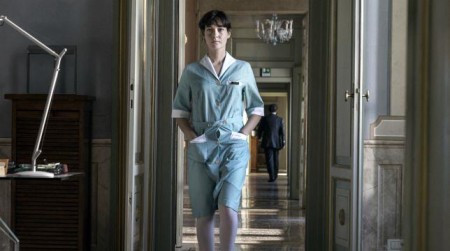
Patient opposition
This film by the director of the renowned mini-series The Best of Youth/La meglio gioventů is a timely one indeed. It concerns a case of sexual harassment in which the person involved fought the web of omertŕ protecting offending males and won in court. Both the man and his associate who supported him went to jail. This protagonist is notable for her courage and determination. The film has a sedate pace that makes it a slow burner, requiring our patience, but in return it conveys the magnitude and complexity of events with some subtlety. (This is something like the way Giordana worked in The Best of Youth.)
Nina (Cristiana Capotondi, who was in the 2013 Open Roads film The Mafia Kills Only in Summer) is an attractive woman preyed upon by a man with power. She takes a job as an attendant at a fancy retirement home at a big estate in the country. The director of the center (Valerio Binasco), interviewing her, corners her and touches her inappropriately. As far as we know, it may only happen once, but it is nasty and exploitative, and Nina does not accept it.
Soon it becomes clear that this has happened to many of the women who work there. But they insinuate that saying nothing is a necessary condition of keeping their jobs. They scorn and exclude Nina for her insistence that the behavior must be brought out and condemned. There is a culture of acquiescence and complicity, what in the south of Italy, for the mafia, is called omertŕ.
All the staff and even a local priest connected with the center (Bebo Storti) tells Nina that she is out of line and must not speak up. Her boyfriend tells her that since he makes enough for both of them, she could just quit this job and get away from the oppressive situation. But she likes the job, and doesn't want to have to do that. She wants justice done. Fortunately, she finds legal support. The film becomes a legal drama, and shows how the case works out in Nina's favor.
Though this is a project Giordana undertook three years ago, it directly relates to the now international Me Too movement against sexual harassment of women. In its subtle, patient unfolding Nome di Donna well conveys a sense of how a single traumatic experience can linger long in the mind and require action. It celebrates Nina's quiet heroism and shows that this kind of injustice can e fought, even in a conservative and protected corner of a Catholic country.
Though in many ways a finely crafted and and certainly timely film, Nome di Donna is not as strong as it could have been. Perhaps it is to be commended for refraining from over-dramatic moments and showing that this kind of crime is very often committed quickly and quietly but no less harmful and lasting in its effect for that. Nonetheless under the circumstances the film feels like rather a missed opportunity. It suffers from various flaws. As Italian critic Marco Cacioppo (Cineforum) puts it, at a certain point it collapses under its own weight, partly by morphing into a legal procedural in the last section that loses touch with the personal and emotional thrust it has in the beginning. Furthermore, as Cacioppo also notes, Nina's behavior in signing a waiver after beginning legal action is inexplicable, and the director and his administrative associate are too obviously and satisfyingly slimy.
Nome di Donna, 92 mins., was theatrically released in Italy 8 Mar. 2018. It was screened for this review as part of the Lincoln Center Open Roads: New Italian Cinema series (31 May-6 Jun. 2018).
Showtimes
June 2 -3:30 PM
June 5 - 4:30 PM
Q&A with Marco Tullio Giordana on June 2
Last edited by Chris Knipp; 06-03-2018 at 06:43 AM.
-
NAPLES IN VEILS/NAPOLI VELATA ( Ferzan Özpetek 2017)
FERZAN OZPETEK: NAPLES IN VEILS/NAPOLI VELATA (2017)
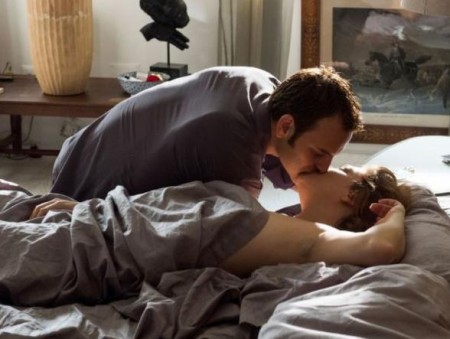
GIOVANNA MEZZOGIORNO AND ALESSANDRO BORGHI IN NAPLES IN VEILS
Dissolving mystery
A little too poetic and meandering for a police procedural, Özpetek's new film takes him to new and rich Neapolitan locations, glamorous and romantic rather than seedy and gangsterish like in movies like Gomorrah. This is darker, sexier, and less conventionally social than the director's previous work. It seems a little shapeless for a whodunit, in addition to being resolutely apolitical, but it has an alluring mood. The plot line seems a little contrived, but makes an excellent framework for glamorous depictions of Naples and interpretations of its lore in this atmospheric and enjoyable film.
Adrianna (Giovanna Mezzogiorno of Muccino's 2001 The Last Kiss and Özpotek's 2003 Facing Windows) meets Andrea (hot new Italian actor Alessandro Borghi) at a party given by one of her friends, and they have an incredible night of love - more graphically depicted than sex in any of Özpetek's previous films. It can't end; they make a date to meet the next day, and she is thinking only of him, sleepy and musing on sex as she goes to a museum of antique sculptures (more bodies). He doesn't turn up for the meeting there. Later she finds out why, when she reports to her work as an autopsy physician and he turns up as a corpse, found dead, definitively recognizable by the large tattoo on his groin.
The plot thickens when Andrea turns out to have a twin brother, Luca (also played by Borghi, of course), who first turns up appearing around town like a doppelgänger, and reports that he and his twin were separated at birth. Luca seems instantly as attracted to Adrianna as Andrea was. Or is he really Andrea, who has perhaps faked his own death? The fact that the corpse was blinded and disfigured suggests deception. The situation remains ambiguous.
Luca's presence might cause confusion, or attract the unknown killers of Andrea, so Adrianna keeps Luca concealed in her apartment, like a sex toy. Meanwhile she has spent quite a bi of time with Antonio (Biagio Forestieri), a police detective on the murder case who quite clearly is becoming enamored of her, despite coming from a less sophisticated milieu than hers.
Even though the ending is inconclusive and unsatisfying (Deborah Yount in her Hollywood Reporter review calls it "arty and ambiguous"), Özpetek seems in exceptionally good form here, bolder and more fluent than usual. The cinematography by Gian Filippo Corticell, featuring location choices that include what Young calls "a maze of gleaming, crisscrossing escalators out of an Escher drawing," as well as the striking but perhaps familiar "eye-popping helicoid stairwell which the camera turns into the shape of an eye," and very modern looking interiors, baroque Neapolitan landmarks. All this may be a little distracting, but it also all adds to the deep, lush sense of atmosphere different from Özpetek's usual brighter more everyday Roman settings. Naples definitely is in a sense the protagonist here, felt to be both revealing and hiding her secrets, as the film title indicates.
Naples in Veils/Napoli velata,90 mins., was theatrically released in Italy 28 Dec. 2017; Moscow film festival. Screened for this release as part of Open Roads: New Italian Cinema.
showtime (Walter Reade Theater):
Saturday, June 2, 8:30pm
Q&A with Ferzan Ozpetek
Last edited by Chris Knipp; 06-03-2018 at 03:39 PM.
-
EQUILIBRIUM/L'EQUILIBRIO (Vincenzo Marra 2017)
VINCENZO MARRA: EQUILIBRIUM/L'EQUILIBRIO (2017)
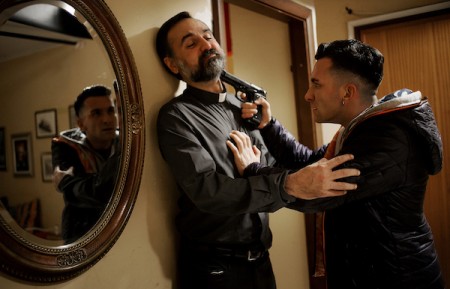
MIMMO BARELLI, GIUSEPPE D'AMBROSIO IN EQUILIBRIUM
Small victories that count
In the calm, polished world of contemporary Italian cinema, Vincenzo Marra's feature Equilibrium/L'Eqilibrio is an exhilaratingly angry movie. Shot with limited means and mostly non-professional actors, it concerns a priest whose quiet struggle for what is right is none the less noble and significant for being largely frustrated. Whatever happens, he has dared to take action against what he sees is wrong. Marra feels that people don't care any more, that we have given up the struggle against the worst powers that be, are dominated by fear of practically everything, and that the gangster forces that dominate his native Naples are nothing compared to the evil rule of the rest of Italy, the north, America, and the world. Father Giuseppe tries, and his path is one the director has frankly talked about as "Christ-like." The modest, understated but incisive The Equilibrium is the most exciting film I have seen in the Lincoln Center Italian film series this year. Its intensity is underlined by the way it follows its protagonist around constantly in a continual series of long single takes, documentary-style.
Father Giuseppe (Mimmo Borrelli, projecting quiet steadfastness) has been a missionary in Africa, and when first encountered, is working to help and protect refugees as part of his work at a small diocese in Rome. He decides to seek reassignment, and quickly gets it, after he feels his vocation is in danger when his relationship with a female coworker has become too emotional: she has confessed to being in love with him and he also has feelings for her. He is sent to a larger parish on the outskirts of Naples, to his native Campania, where he comes from.
Father Giuseppe arrives back at the land of Camorra-sanctioned waste mismanagement chronicled in the film Biutiful Cauntri (Open Roads 2008) - where the constant mindless burning of toxic waste has caused Italians to call the region La terra dei fuoci, the land of fires. This is an area where order is maintained not by government but by La Camorra, the local Mafia. (The situation was also chronicled in the Open Roads 2007 fllm See Naples and Die and in Roberto Saviano's book on which Matteo Garrone's Cannes Grand Prix-winning film Gomorrah was based.)
Father Giuseppe comes to replace a veteran cleric, Don Antonio (Roberto Del Gaudio, convincing as a glib fake), who has been and remains outspoken against the industrial waste problem in the area. Don Antoino seems like a good guy. He talks about the waste issue and about "speaking out" to his congregation, and he points out the burning garbage to Giuseppe. But Father Antonio turns out not really to be one for doing anything. Quite the contrary, though he tells Giuseppe when he leaves to get in touch if there is any problem.
The story hereafter focuses on particulars. It turns out the waste issue was a safe one. Objection to it is widespread and responsibility is diffuse. Such is not the case for wrongs Father Giuseppe meets. The first thing he runs into is that kids, including Davide, the altar boy, are playing ball in the street while the parish playing court is occupied by a tethered goat that is locked in. When he asks the nun who works at the parish she says this is because the owner of the goat is "a very important person." His effort to set this situation to rights and tie the goat outside are the first thing that arouses he disapproving gaze of the local Camorra.
The statistics on cancer and other illnesses from the toxic waste and fires are appalling. He goes to a hospital to visit a woman dying of cancer (Astrid Meloni) who begs him to persuade her son Saverio (Giuseppe D’Ambrosio) to see her. Eventually Giuseppe persuades the unwilling Saverio to visit his mother and in doing so he learns the young man's job.He stands guard with a whip in an abandoned building where addicts do their drugs. Why not a better job? Because there aren't any, and straight jobs don't pay anything. The arrangement is to protect Camorra drug interests: if the addicts used in a public, unguarded place, it would draw in the police and interfere with the drug trade.
The same apples when a more serious issue arises after a parishioner, Assunta (Francesa Zazzera), comes not to confess but to chat. She suspects that her boyfriend is abusing her daughter, and this may be widespread in her building. Nobody can say anything about this because the building is a center for the drug trade, and bringing in the police would jeopardize it.
When Giuseppe calls in Don Antonio, he scoffs and says Assunta is crazy, having delusions caused by anti-psychotic medication. The nun is scornful of Giuseppe's action on the goat occupying church space. He should leave things the way they are, she says sourly. That is the proper way to behave.
Don Giuseppe persists with Saverio and with Assunta. He has Assunta's daughter tested and a doctor certifies that she has been used sexually, which he presents to the police. This leads to his being roughed up by Camorra toughs and threatened with a pistol. They send Saverio to threaten him, and then rub Saverio out. Has Don Giuseppe caused Saverio's death? Perhaps; but the pressure not to make waves, to maintain "equilibrium," the status quo, is clearly for Don Giuseppe unacceptable. The death of Saverio is only a small sign of the insignificance of human life to the Camorra. Eventually Don Giuseppe is removed and Don Antonio comes back, taking over the parish again. Finally all Don Giuseppe is able to do is save Assunta and her daughter. But he leaves an honorable man, and Don Antonio is revealed to be a scoundrel.
In his Variety review from Venice, Boyd van Hoeij is approving of this film but points out that it films about the "far-reaching influence" of the crime syndicates in the Italian South "are many," and that Marra "isn’t working on the scale or with the virtuosity of people like Gomorrah’s Matteo Garrone or someone like Paolo Sorrentino." He also says some of the non-actors are less convincing than ones Marra used in a previous film. This may be true, but Equilibrium has a specificity and conviction not found in those more impressive works. There is something austere and relentless here that strikes home.
When this was screened at Lincoln Center director Vincenzo Marra was impressive for his passion and his modesty. He began by saying that the opening trailer for the upcoming Visconti retrospective made him think that we should all just go to lunch (it was a 1 p.m. showing). On the other hand he made clear that he remains convinced of the value of small but sincere films like this one about important things - that small inroads on big wrongs have true value.
Equilibrium/L'Equilibrio, 90 mins., debuted a Venice 5 Sept. 2017. opening theatrically in Italy (typically, very briefly, as Marra pointed out), distributed locally by Warner Bros., a fortnight later; it also was shown at London, Busan, and Buenos Ares. It was screened for this review as part of the 2018 Open Roads: New Italian Cinema series at Lincoln Center.
Showtimes (Walter Reade Theater)
Q&A with Vincenzo Marra on June 3
June 3 -1:00 PM
June 6 - 4:30 PM
Last edited by Chris Knipp; 06-03-2018 at 09:46 PM.
 Posting Permissions
Posting Permissions
- You may not post new threads
- You may not post replies
- You may not post attachments
- You may not edit your posts
-
Forum Rules





 Reply With Quote
Reply With Quote






Bookmarks